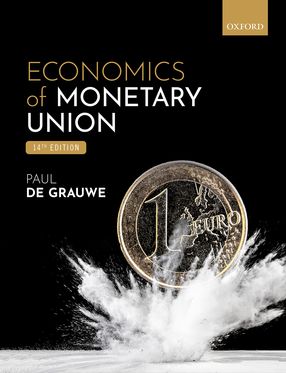Economics of the Monetary Union

Economics of the Monetary Union
|
ISBN: |
9780192849779 |
|
Binding: |
Paperback |
|
Published: |
20 Sep 2022 |
|
Availability: |
|
|
Series: |
$107.95 AUD
$120.99 NZD
Add To Cart Request an inspection copyDescription
Reflecting the most update-to-date coverage of institutional changes within the European Monetary Union, the fourteenth edition of De Grauwe's established textbook continues to encourage students to think critically about the sustainability of the Eurozone. The author uses an authoritative, concise and exciting approach to analyse theories and policies relating to monetary union, allowing students to develop a balanced understanding of different arguments and perspectives.
Part One examines the implications of adopting a common currency while Part Two considers the problems associated with running a monetary union. Both parts analyse Europe's experience and the issues faced by the European Central Bank.
Case studies throughout the text provide rich, real life and qualitative examples to help students connect with the concepts and policies presented. Additionally, each chapter ends with a conclusion recapping the core issues, and a set of questions, which encourages students to test their knowledge and stretch their understanding further.
The fourteenth edition is available for students and institutions to purchase in a variety of formats, and is supported by online resources. The ebook offers a mobile experience and convenient access along with functionality tools, navigation features and links that offer extra learning support: Find the eBook on VitalSource.
This book is accompanied by the following online resources.
For students:
- Links to data sources
- Essay questions
- Web links
- Paul De Grauwe on Twitter
For Lecturers:
- PowerPoint slides
- Instructor's manual
Contents
Part 1: Costs and Benefits of Monetary Union
1: The costs of a common currency
2: The theory of optimum currency areas: a critique
3: The benefits of a common currency
4: Costs and benefits compared
Part 2: Monetary Union
5: The fragility of incomplete monetary unions
6: The transition to a monetary union
7: How to complete a monetary union
8: Political economy of deconstructing the Eurozone
9: The European Central Bank
10: Monetary policy in the Eurozone
11: Fiscal policies in monetary unions
12: The euro and financial markets
Authors
Paul De Grauwe, John Paulson Chair in European Political Economy, London School of Economics